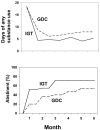A "community-friendly" version of integrated group therapy for patients with bipolar disorder and substance dependence: a randomized controlled trial
- PMID: 19573999
- PMCID: PMC2735139
- DOI: 10.1016/j.drugalcdep.2009.04.018
A "community-friendly" version of integrated group therapy for patients with bipolar disorder and substance dependence: a randomized controlled trial
Abstract
Background: Integrated group therapy, a new treatment for patients with bipolar disorder and substance use disorder, has previously been found to be efficacious in reducing substance use, but its length (20 sessions) and need for highly trained therapists may limit its adoption in substance use disorder community treatment programs. This paper compares a briefer (12 session) version of integrated group therapy, led by substance use disorder counselors without previous cognitive-behavioral training or bipolar disorder experience, to group drug counseling.
Methods: Sixty-one patients with bipolar disorder and substance dependence, taking mood stabilizers, were randomized to 12 sessions of integrated group therapy (n=31) or group drug counseling (n=30).
Results: Analyses of primary outcomes showed trends favoring integrated group therapy, with greater reduction in substance use during follow-up and a greater decline in risk of mood episodes during treatment. Secondary analyses favored integrated group therapy, with a significantly greater likelihood of achieving total abstinence, a significantly shorter time to the first abstinent month, and a significantly greater likelihood of achieving a "good clinical outcome" (a composite measure encompassing both substance use and mood simultaneously).
Conclusions: A shortened version of integrated group therapy can be delivered successfully by substance use disorder counselors, with better overall outcomes than those achieved with group drug counseling.
Trial registration: ClinicalTrials.gov NCT00227838.
Figures
References
-
- Anton RF, O’Malley SS, Ciraulo DA, Cisler RA, Couper D, Donovan DM, Gastfriend DR, Hosking JD, Johnson BA, LoCastro LS, Longabaugh R, Mason BJ, Mattson ME, Miller WR, Pettinati HM, Randall CL, Swift R, Weiss RD, Williams LD, Zweben A. Combined pharmacotherapies and behavioral interventions for alcohol dependence. The COMBINE study: a randomized controlled trial. JAMA. 2006;295:2003–2017. - PubMed
-
- Cassidy F, Ahearn EP, Carroll BJ. Substance abuse in bipolar disorder. Bipolar Disord. 2001;3:181–188. - PubMed
-
- Cisler RA, Zweben A. Development of a composite measure for assessing alcohol treatment outcome: operationalization and validation. Alcohol Clin Exp Res. 1999;23:263–271. - PubMed
-
- Colom F, Vieta E, Martinez-Aran A, Reinares M, Goikolea JM, Benabarre A, Torrent C, Comes M, Corbella B, Parramon G, Corominas J. A randomized trial on the efficacy of group psychoeducation in the prophylaxis of recurrences in bipolar patients whose disease is in remission. Arch Gen Psychiatry. 2003;60:402–407. - PubMed



